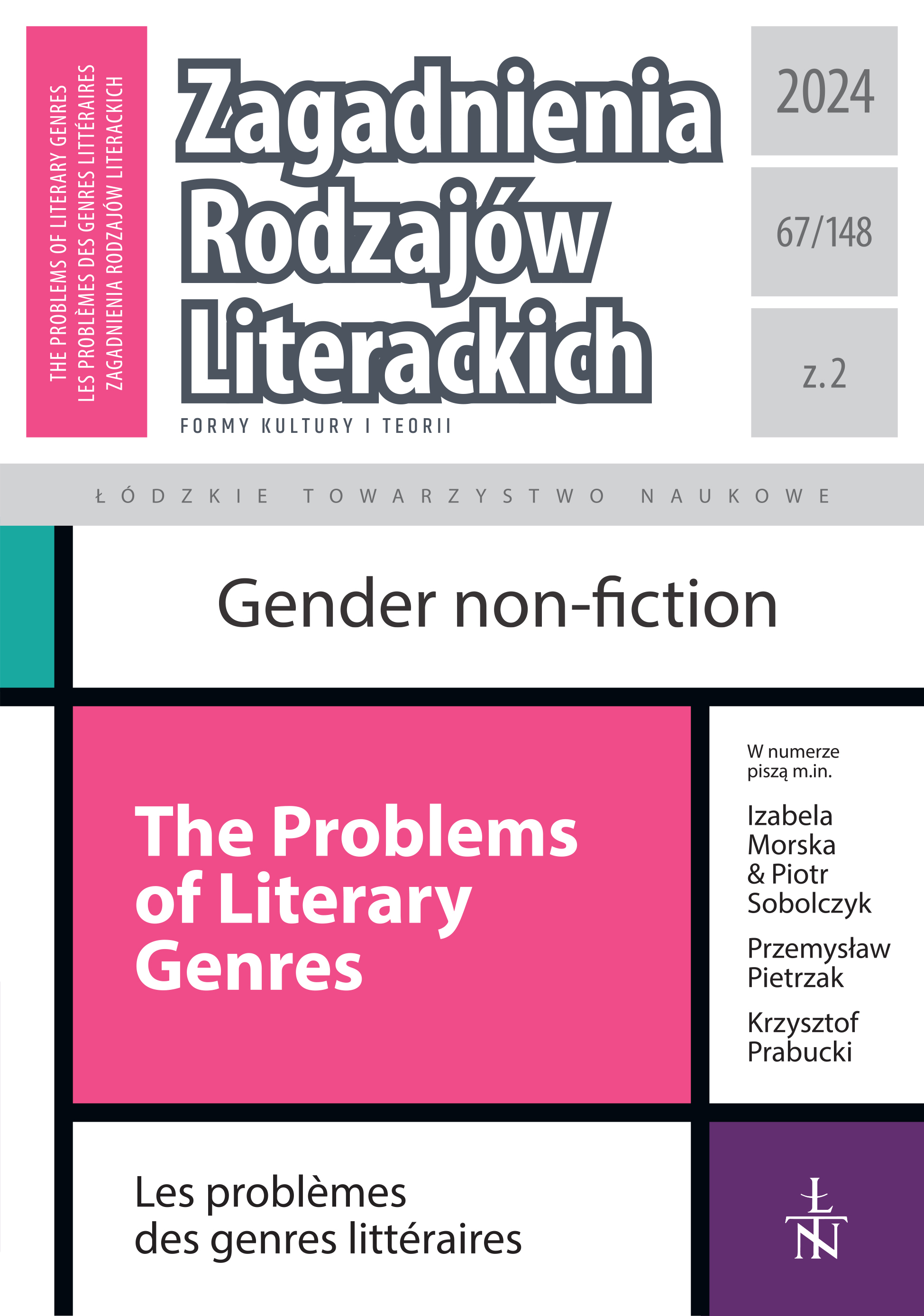Echoes of the Avant-Garde — the Case of Julian Kornhauser
DOI:
https://doi.org/10.26485/ZRL/2024/67.2/5Keywords:
avant-garde; neo-avant-garde; New Wave; poetic experiment; poetry of Julian KornhauserAbstract
This article examines the influence of avant-garde poetics on the poetry of one of the representatives of the New Wave — Julian Kornhauser. The text consists of two main parts. The first part explores how the creators of the New Wave perceived the avant-garde and what they aimed to achieve, and provides definitions of the avant-garde as an aesthetic phenomenon to broaden the research perspective and specify the correlation between the poetry of the New Wave and the historical avant-garde. The second part of the sketch consists of a collection of microanalyses of Julian Kornhauser’s poetic texts, which refer to avant-garde linguistic and aesthetic experiments. In the selected poems, we find, beyond intertextual references, plays with the works of Rilke, the Futurists, or Miron Białoszewski. This compilation aims to help answer whether (and to what extent) Julian Kornhauser is a post/neo-avant-garde poet. It also highlights the broad circles of cultural dialogues, which this creativity invites us to follow. This part also demonstrates the variety of forms of these references — from cryptic quotations through imitation (parody) of poetics to giving avant-garde poetic experiments new semantic and formal qualities. Julian Kornhauser appears as a descendant of the avant-garde — conscious of its power, constant presence, variability, and the impossibility of many of its demands. He is its disobedient ward, using its demands only partially, reshaping their original form. The avant-gardism of Kornhauser’s poetry, or rather, the inevitability, or, as Jan Sowa wrote, the persistence of the avant-garde, is manifested primarily at the intersection of poetry (prose) and reality, creating a new quality that allows for their correlation and coexistence.
Downloads
References
Awangarda w perspektywie postmodernizmu (1996), red. G. Dziamski, Wydawnictwo Fundacji Humaniora, Poznań.
Barańczak Stanisław (2006), Wiersze zebrane, Wydawnictwo a5, Kraków.
Barthes Roland (2009), Stopień zero pisania, przeł. K. Kot, Aletheia, Warszawa.
Bauman Zygmunt (1994), Ponowoczesność, czyli o niemożliwości awangardy, „Teksty Drugie” nr 5–6.
Bieszczad Liliana (2009), Koniec awangardy a przełom postmodernistyczny, „Tekstualia” nr 3.
Burska Lidia (2012), Awangarda i inne złudzenia. O pokoleniu ’68 w Polsce, Słowo obraz/terytoria, Gdańsk.
Franczak Jerzy (2010), Awangarda — niedokończony projekt, „Teksty Drugie” nr 4.
Gazda Grzegorz (1987), Awangarda — nowoczesność i tradycja, Wydawnictwo Łódzkie, Łódź.
Graf Paweł (2018), Automobil w pędzie. Studia o futuryzmie i futurystach, Wydawnictwo Naukowe Uniwersytetu Adama Mickiewicza, Poznań.
Grzech Jarosław (1997), Stawrogin — problemy interpretacji a idea bohatera, „Teksty Drugie” nr 6.
Janion Maria, Przybylski Ryszard (1996), Sprawa Stawrogina, Wydawnictwo Sic!, Warszawa.
Kornhauser Jakub (2022), Niebezpieczne krajobrazy. Surrealizm i po surrealizmie, Wydawnictwo Uniwersytetu Jagiellońskiego, Kraków.
Kornhauser Julian (2016), Wiersze zebrane, Wydawnictwo WBPiCAK, Poznań.
Kornhauser Julian (2018), Krytyka zebrana. T. 1, red. A. Gleń, J. Kornhauser, Wydawnictwo WBPiCAK, Poznań.
Kornhauser Julian (2019), Krytyka zebrana. T. 2, red. A. Gleń, J. Kornhauser, Wydawnictwo WBPiCAK, Poznań.
Kornhauser Julian (2021), Pisma slawistyczne, Wydawnictwo WBPiCAK, Poznań.
Kuczyńska-Koschany Katarzyna (2017), Rilke poetów polskich, Wydawnictwo Naukowe Uniwersytetu Mikołaja Kopernika, Toruń.
Orska Joanna (2019), Awangarda jest potrzebna jak powietrze, „Mały Format” nr 7–8, malyformat.com/2019/08/awangarda-potrzebna-powietrze [dostęp: 2.09.2024].
Pawelec Dariusz (1991), Poezja Stanisława Barańczaka. Reguły i konteksty, Wydawnictwo Uniwersytetu Śląskiego, Katowice.
Peiper Tadeusz (1922), Punkt wyjścia, „Zwrotnica” nr 1, Kraków.
Rzeczy do nazwania. Wokół Kornhausera (2016), red. A. Gleń, J. Kornhauser, Wydawnictwo WBPiCAK, Poznań.
Sowa Jan (2010), Nieznośna uporczywość awangardy [w:] Manifest Neoawangardy. Sztuka wobec kapitalizmu kognitywnego, posthumanizmu i nauk o złożoności, Centrum Sztuki Współczesnej Zamek Ujazdowski, Warszawa.
Szabolcsi Miklós (1971), Avant-Garde, Neo-Avant-Garde, Modernism: Questions and Suggestions, „New Literary History” nr 1.
Szulc Packalén Małgorzata Anna (1997), Pokolenie 68. Studium o poezji polskiej lat siedemdziesiątych, Instytut Badań Literackich PAN, Warszawa.
Śliwiński Piotr (2016), Kartografia ziemskiego bólu. Stanisław Barańczak „Bo tylko ten świat bólu”, „Przestrzenie Teorii” nr 26.
Śniecikowska Beata (2019), TAK odnalezione! Pierwsze czytanie pierwszej ulotki polskich futurystów, „Teksty Drugie” nr 3.
Świeściak Alina (2015), Fikcja awangardy?, „Teksty Drugie” nr 6.
Teorie awangardy. Antologia tekstów (2020), red. I. Boruszkowska, M. Kmiecik, J. Kornhauser, Wydawnictwo Uniwersytetu Jagiellońskiego, Kraków.
Tradycje eksperymentu/eksperyment jako doświadczenie (2019), red. J. Kornhauser, K. Hoffman, B. Sienkiewicz, Wydawnictwo Uniwersytetu Jagiellońskiego, Kraków.
Downloads
Published
How to Cite
Issue
Section
License
Copyright (c) 2024 Łódzkie Towarzystwo Naukowe and authors

This work is licensed under a Creative Commons Attribution 4.0 International License.







